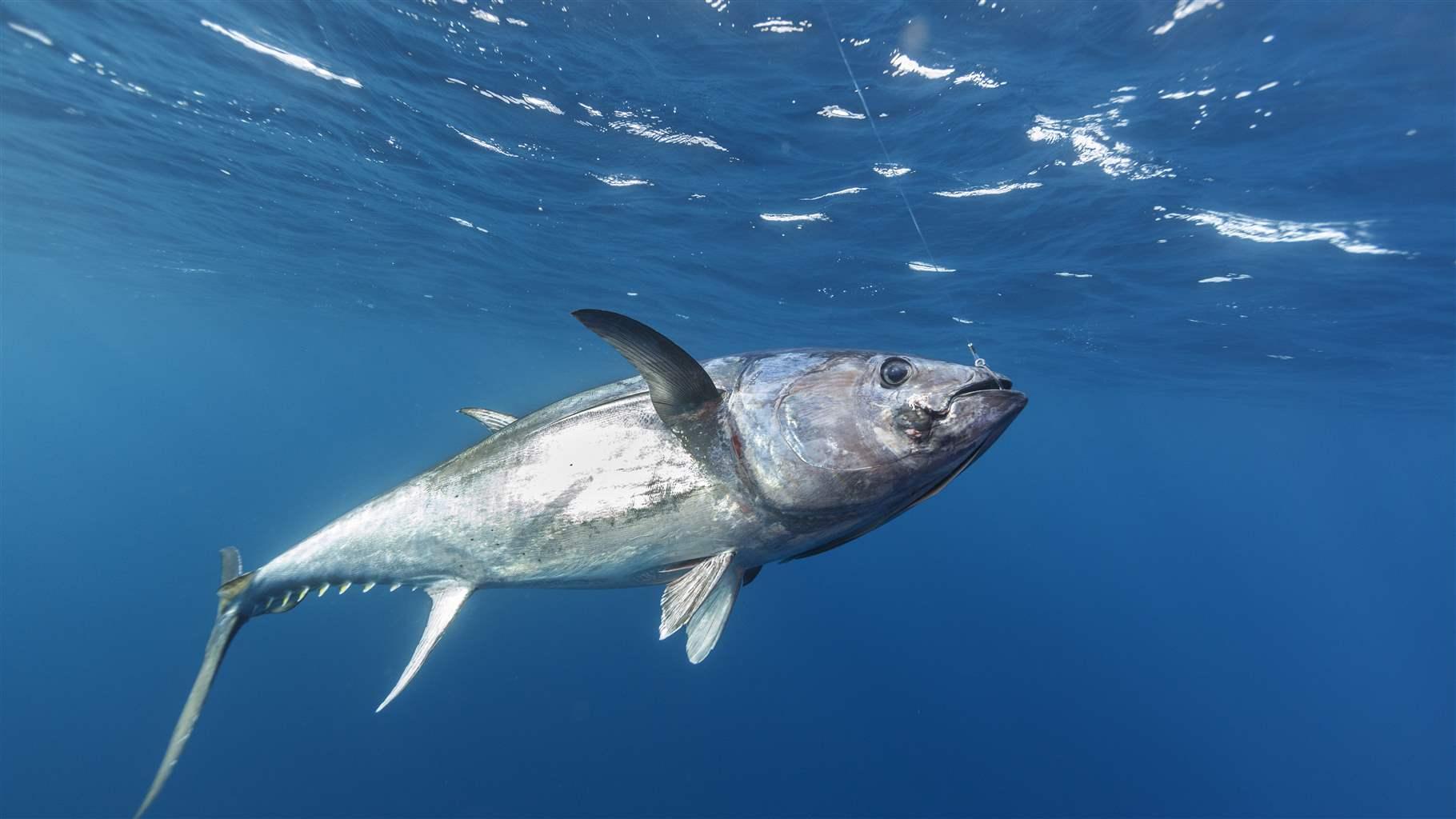World Tuna Day and UN meeting offer chance to applaud management progress while urging more action
By Grantly Galland Senior Officer International Fisheries
For decades, tuna fisheries around the world have been economic juggernauts, the nucleus of a global market worth US$40 billion annually. Demand of these fish—specifically bluefin, skipjack, bigeye, albacore and yellowfin—has also driven some species to the brink of collapse, and overfishing continues to threaten the sustainability of numerous tuna populations.
This is happening despite a system designed to prevent stock declines: For more than 20 years, the United Nations Fish Stocks Agreement (UNFSA) has directed countries to cooperate to ensure healthy and sustainable fish populations.
Governments work toward that goal mainly through regional fisheries management organisations (RFMOs), which are international bodies empowered to manage shared fish populations. And there are five RFMOs devoted to tunas: the Commission for the Conservation of Southern Bluefin Tuna (CCSBT), the Inter-American Tropical Tuna Commission (IATTC), the International Commission for the Conservation of Atlantic Tunas (ICCAT), the Indian Ocean Tuna Commission (IOTC), and the Western and Central Pacific Fisheries Commission (WCPFC).
On 22 May, the UN will convene in New York to review progress toward meeting the sustainability goals of the UNFSA. In 2016, for the previous UNFSA review, The Pew Charitable Trusts conducted an evaluation of the RFMOs and their efforts towards sustainability. That year, we determined that all five tuna RFMOs were failing to fulfill their international obligations.
As part of the UNFSA, the RFMOs have also agreed to have their performances reviewed by independent panels that offer recommendations for improving sustainability. In 2019, after all of the tuna RFMOs had conducted at least one such review, we looked at ICCAT, IATTC and WCPFC, and found that none were doing a sufficient job responding to the recommendations. Later this month, Pew will release a new evaluation of the RFMOs for the upcoming meeting. In the meantime, World Tuna Day—02 May—offers an opportunity to preview our findings. Here’s a summary of how tuna RFMOs have performed since 2016.
Some notable progress on precautionary fisheries management, but more effort needed to protect ecosystems
Overall, RFMOs have made significant improvements in their efforts to deter illegal, unreported and unregulated fishing through monitoring, compliance and enforcement measures, and they should continue this work. However, in other areas they have fallen short of their commitments to sustainability.
For decades, fisheries managers determined catch limits based on annual negotiations, which were often contentious, highly politicised discussions driven primarily by the fishing industry’s pursuit of profit, not sustainability. As a result, these negotiations often essentially sanctioned overfishing and were a major driver of the decline of some species.
But in recent years, RFMOs have been pivoting to a long-term, science-based approach known as harvest strategies (or management procedures). This more precautionary management style sets fishing targets based on the current size of a stock and uses computer modeling of environmental factors and other changes on the water—not just short-term considerations—to determine annual catch limits.
RFMOs have made solid progress on this front. CCSBT and ICCAT have fully implemented harvest strategies for some stocks, and IOTC and WCPFC have adopted this superior management approach, although they have not yet implemented it. Only IATTC has yet to adopt any harvest strategies, but that may change this year.
RFMOs are also slowly moving towards more ecosystem-based fisheries management (EBFM). A more holistic approach than previous ones, EBFM accounts for the impacts of fishing, other human activities, and environmental factors like predator-prey relationships and climate change when designing catch limits and harvest strategies. All five tuna RFMOs have called for or adopted specific measures to protect non-target species, such as sea turtles and sharks. But none of these RFMOs have adopted a comprehensive management approach that factors in all impacts of fishing in all of its fisheries, managed and unmanaged. They must do better and integrate EBFM throughout all fisheries and affected habitat.
More work needed to restore troubled populations
Historically, the demand for some tunas has outstripped supply, leading to severe depletion of valuable stocks. For example, high demand and mismanagement combined to drive the Pacific bluefin tuna population to just 2.6 percent of its unfished level before a recovery plan was finally adopted. That trend began to reverse in 2017 when IATTC and WCPFC adopted a joint rebuilding plan, and now there is a high probability that the Pacific bluefin population will rebuild to 20 percent of its unfished level by 2029, even while gradually increasing catch limits. CCSBT and ICCAT have successfully recovered several tuna populations that were highly depleted, but no RFMO can truly claim to have all its stocks at or above the size required for sustainability. IOTC, in particular, is far from this target, as two of the major tuna stocks—plus blue marlin, striped marlin, longtail tuna and narrow-barred Spanish mackerel—are all now either overfished or experiencing ongoing overfishing.
Upcoming meeting should applaud positive trends but encourage more good work
Although RFMOs have made progress towards tuna sustainability, they must do more—specifically by implementing an approach that considers fisheries’ effects on the whole ocean.
This World Tuna Day, it’s important to note good work and to encourage RFMOs to keep it up. As RFMOs work towards modernising their fisheries and recommitting to precautionary, science-based management, more efforts are needed to ensure that fisheries remain sustainable and that fished populations remain healthy. The 22 May UN meeting is an opportunity to take an honest look at what RFMOs have achieved and what they still need to do.
SOURCE: PEW/PACNEWS















